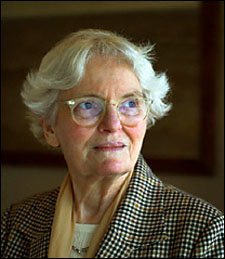Architect to receive Radcliffe Medal
Denise Scott Brown honored at Radcliffe Day luncheon
Denise Scott Brown, an architect and planner and principal of the Philadelphia firm Venturi, Scott Brown and Associates, will receive the 2005 Radcliffe Institute Medal tomorrow (June 10) at the Radcliffe Institute for Advanced Study at the yearly Radcliffe Day luncheon. 
The medal is awarded annually during Harvard Commencement/Reunion Week by the Radcliffe Institute to an individual whose life and work has had a significant impact on society. Past honorees include Madeleine Korbel Albright, Margaret Atwood, Elizabeth Dole, Billie Jean King, Janet Reno, and Katharine Graham.
“Having worked closely with the Radcliffe Institute, I have learned to admire intensely the creativity, energy, and life-enhancing conviviality of these brilliant scholars, artists, and professionals. I feel enormously honored that the institute has seen congruence between my work and theirs,” Scott Brown said.
Scott Brown has helped significantly to redirect the mainstream of modern architecture since the mid-1960s. No architect studying or in practice can have avoided her work or missed her call to broaden architecture to include ideas on pluralism and multiculturalism; Pop Art, popular culture, and the everyday landscape; symbolism, iconography and context; the uses and misuses of history; electronic communication; the patterns of activities; the doctrine of functionalism; the relevance of mannerism; the role of generic building; and uncomfortably direct and uncomfortably indirect design – all these, in the making of architecture and urbanism today.
Scott Brown feels she owes her views to a childhood and first architecture training in South Africa in the 1940s and early 1950s, followed by London and the Architectural Association, 1952 – 1955, and by the University of Pennsylvania, 1958 – 1965. She received master’s degrees in city planning and architecture from Penn and spent five years on the faculty, while the social planning movement was being initiated there. She taught, as well, at the University of California, Berkeley, the University of California, Los Angeles, Yale, and Harvard, and has lectured and advised worldwide on architecture, urbanism, and education.
When she joined Robert Venturi in practice, she was well known for her contributions to theoretical research and education on the nature of cities. The early fruits of their collaboration were the research studios “Learning From Las Vegas” and “Learning From Levittown.” These projects and the book “Learning From Las Vegas” (by Robert Venturi, Denise Scott Brown, and Steven Izenour, 1972) challenged architects to study the human use and social context of architecture, the role of perception and memory in architecture, and the communicative possibilities of architecture. A primary focus had to do with symbolism and iconography. This turned the authors once again to history, to rediscover facets of architecture forgotten by the Modern movement.
Since 1967, as a principal of the firm now called Venturi, Scott Brown and Associates, she has participated in the broad range of the firm’s projects, including the Sainsbury Wing of the National Gallery in London, the Conseil Général complex in Toulouse and the Mielparque Nikko Kirfuri Hotel and Spa near Nikko, Japan. As principal in charge for urban planning, urban design, and campus planning, her work has included urban planning for South Street, Philadelphia, Miami Beach, and Memphis, Tenn.; programming for the National Museum of the American Indian; and a plan for the Bouregreg Valley in Morocco.
Today, Scott Brown focuses on urban university planning and design, where she employs tools evolved by melding the methods of planning and architecture. Her projects have included campus plans for Dartmouth College, the University of Pennsylvania, Williams College, and the Radcliffe Institute for Advanced Study at Harvard. She directed the University of Michigan campus master plan and plans for several of its subcampuses. In this role, she proposed design concepts for the Baker-Berry Library at Dartmouth, the Perelman Quadrangle precinct at the University of Pennsylvania, and the Life Sciences complex at the University of Michigan, and was able to exert guidance over these projects from campus planning, through design and construction, to successful use.
Scott Brown has recently written and advised on urban planning and design for the World Trade Center site and for Philadelphia’s Penn’s Landing. In the past year she has worked on a campus life plan and campus center for Brown University and a master plan update for Tsinghua University in Beijing. Her latest publication is “Architecture as Signs and Systems for a Mannerist Time” (Harvard University Press, 2004), written with Robert Venturi.




